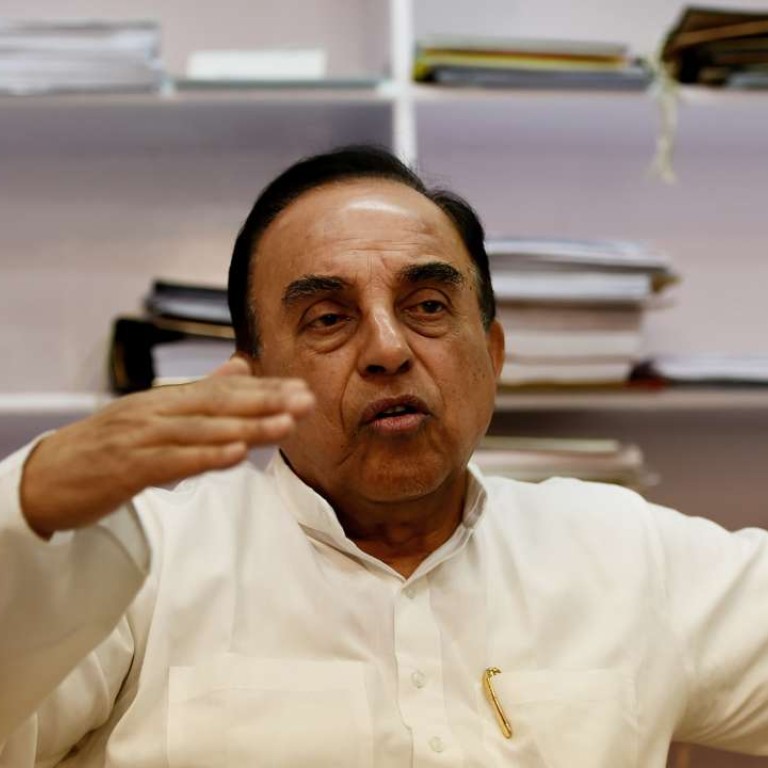
Modi’s key aide blames poor planning for India’s currency crisis
A member of parliament and one of Prime Minister Narendra Modi’s top aides has blamed poor planning and execution by the government for the banknote crisis that has engulfed India, with tens of thousands of people queueing up outside banks and empty ATMs following New Delhi’s decision to replace large-denomination notes with new ones.
“I am appalled by the lack of preparation,” said Subramanian Swamy in an exclusive interview to This Week in Asia. A dogged crusader against corruption, who is often called India’s Trump for his campaign against the high and the mighty and serial muckraking, said Modi’s banknote ban was expected as fighting “black money” – as unaccounted wealth is called in India – was the ruling Bharatiya Janata Party’s (BJP) key electoral plank.
“We have been in power for nearly two and a half years. The finance ministry should have prepared for this from the very first day. It is easy to argue that the ministry was not in the loop, but that is no excuse for not having a contingency plan,” said Swamy, adding that only Modi would have known about the ban decision as sharing it within the party or the government would have robbed it of its effectiveness.
“Ad hoc roadside kiosks should have been set up for all and special kiosks organised for senior citizens. All these should have been planned as part of a contingency plan.”

According to Swamy, there was also a security aspect to Modi’s decision. “The previous government gave the contract for currency paper to the same London-based company that supplies currency paper to Pakistan, helping Pakistan to counterfeit Indian notes and finance militancy in India at zero cost,” he said. India, however, is yet to discontinue the contract with the London company, he added.
A Harvard-trained economist and a former minister of commerce, the articulate and media-savvy Swamy enjoys a cult-like following among the BJP cadre. Modi nominated him to the upper house of Parliament this year as reward for his successful corruption cases against the previous Congress government and his ongoing embezzlement lawsuit against Congress president Sonia Gandhi and her son Rahul.
Swamy is currently in Hong Kong, where he is to deliver a talk on anti-corruption efforts in India at the Foreign Correspondents’ Club on Monday.
Modi, who rode to power on the promise of engineering faster economic growth and ridding the country of endemic corruption, has won plaudits for many of his efforts, including his campaign to reboot India as a manufacturing hub. But initial praise for Modi’s banknote initiative last week was quickly replaced by mounting public anger as exchanging and depositing old notes has proved to be onerous, involving filling up forms and standing in long queues, with ATMs ill-equipped to dispense new notes.

“Recalibration of ATMs will be completed within two weeks,” Finance Minister Arun Jaitley said on Friday. Meanwhile, reports of sporadic incidents of violence are trickling in from across the country as patience is running out for customers waiting for hours in serpentine queues outside banks and ATMs.
The government has asked people to exchange old 500 and 1,000 rupee notes by December 30. The central bank has said banks have enough cash and it is ensuring the new bank notes are delivered across the country, but businesses are complaining of a cash crunch at banks.
Several opposition leaders are demanding a rollback of the measure in view of the hardship it is causing, posing for Modi one of his biggest administrative challenges that threatens to snowball into a political crisis.
Reacting to the growing chorus of criticism, an emotional Modi on Sunday said he felt the people’s “pain” but was determined to carry on his fight. “I know the forces are up against me, they may not let me live... they may ruin me because their loot of 70 years is in trouble, but I am prepared.”

The hardest hit have been the poor outside the formal banking system, who are typically illiterate and are now being forced to pay touts to fill out forms to exchange their currency notes. India has the highest number of unbanked adults in the world – 21 per cent of the global total, followed by China, at 12 per cent; and Indonesia, 6 per cent. In 2014, Modi launched an ambitious programme to ensure a bank account for every household, halving India’s unbanked population, but it still stands at 233 million, according to a report by PricewaterhouseCoopers India.
Modi had also promised to bring back the money rich Indians have funnelled abroad. Opposition leaders have criticised the government for letting these “big fish” off the hook while harassing hard-working middle-class with the currency ban.
“Some names, who have foreign deposits, have come forth,” said Swamy. In February last year, The Indian Express newspaper published a list of top 100 HSBC account holders with Indian addresses, which included businesspeople, politicians and their families.
Asked why the government is yet to book anybody with foreign accounts, Swamy said: “That question has to be directed at the finance ministry, not me. I have no clue why nothing has been done.”

